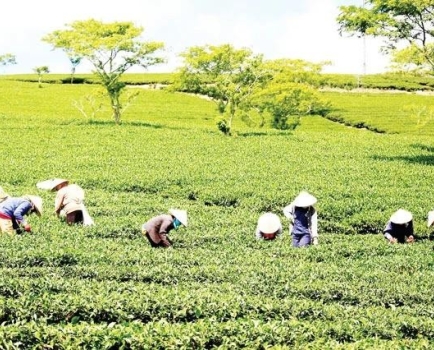Green consumption trends on the rise in Vietnam
Thu, 14 Nov 2024 13:30:00 | Print | Email Share:
Green consumption is rapidly gaining momentum in Vietnam thanks to increased awareness of environmental protection and sustainability, impacting consumer purchasing habits and presenting both opportunities and challenges for businesses, particularly small- and medium-sized enterprises (SMEs).
At a conference themed "Taking the Lead in Dual Transition for a Greener Vietnam" hosted by VIR on November 12, Le Minh Trang, associate director of retail measurement services at NielsenIQ (NIQ), shared her insights on green consumption trends in Vietnam.
According to the NielsenIQ Consumer Outlook and Expectation 2024 study in Vietnam, 16 per cent of Vietnamese consumers have incorporated sustainable futures into their long-term priorities, while 24 per cent are focusing on sustainable lifestyles in their short-term plans.
 Le Minh Trang, associate director of retail measurement services at NielsenIQ
Le Minh Trang, associate director of retail measurement services at NielsenIQ
"Green consumption in Vietnam is making encouraging strides as consumers become increasingly concerned about sustainability," said Trang.
The sectors most impacted by green consumption trends in Vietnam include food and beverages, personal care, fast-moving consumer goods, and consumer electronics. "Consumers are increasingly prioritising organic products, environmentally friendly packaging, and energy-efficient devices," Trang emphasised.
Adopting green production strategies has brought significant business benefits for companies. As Trang noted, 42 per cent of consumers in Asia-Pacific consider it very important for businesses to actively reduce their environmental impacts, and 34 per cent regard it as an important factor. These benefits include increased customer loyalty, improved profit margins through cost savings, enhanced brand image, and expanded export opportunities.
"Transitioning to green production helps businesses reduce long-term costs by optimising energy, raw materials, and reducing waste, thereby improving profit margins. Moreover, companies also benefit from improved brand image and competitive advantages in the market," Trang added.
However, businesses will face greater pressure from consumers and environmental regulations in the next five years. Lack of supporting technology, high production costs, difficulty in prioritising investments, and a lack of transparency in the supply chain are major issues that need to be addressed. Additionally, the absence of standards and harmonisation also reduces the motivation for SMEs to implement changes.
According to a recent NIQ report on SMEs, 17 per cent of companies in Asia-Pacific derive their product value from healthy and nutritious products, while 12 per cent come from sustainable and environmentally friendly products, on par with the global average. In this context, SMBs are facing a number of challenges and opportunities in adopting sustainable business strategies.
"One of the biggest challenges that SMEs face is the lack of scalable technology. Many small businesses struggle to access the necessary technology to implement sustainable solutions, making it difficult to capitalise on the benefits of technological innovations," Trang said.
Nevertheless, SMEs also face many opportunities, such as the development of advanced technologies, the trend towards renewable energy, and pressure from consumers and regulations. "Business model innovation is the key for these companies to enhance their competitiveness and achieve long-term sustainable growth," Trang added.
According to Trang, to capitalise on these opportunities, businesses need to proactively adapt to green consumption trends. First, they need to actively monitor legal regulations, effectively manage their supply chains, and proactively manage risks. Investing in independent certifications, community collaborations, and avoiding excessive price increases for sustainable products are also important steps.
Additionally, businesses should not overprice sustainable products, as unreasonable price hikes may dampen consumer interest. Instead, companies need to substantiate their claims with concrete evidence. Trang also said that businesses that quickly adapt and transition to sustainable models will gain a competitive advantage in the market, while also contributing to a greener and more sustainable future.
By: Phuong Uyen/ VIR
Source: https://vir.com.vn/green-consumption-trends-on-the-rise-in-vietnam-117659.html
---------------------------------------------
Same category News :













